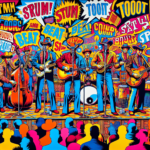Simple Plan Overview

- Estimated Net Worth: $10 million
- Age: Varies (band members born between 1979-1981)
- Born: Canada
- Died: N/A
- Gender: Male
- Country of origin: Canada
- Source of wealth: Music, Tours, Merchandise
Early Life and Background
Simple Plan, a Canadian rock band, was formed in 1999 in Montreal, Quebec. The band consists of Pierre Bouvier, Chuck Comeau, Jeff Stinco, Sébastien Lefebvre, and David Desrosiers. Each member had a unique upbringing that contributed to their collective success. Pierre Bouvier and Chuck Comeau were childhood friends who shared a passion for music, which led them to form their first band, Reset, in the early 1990s.
Jeff Stinco, Sébastien Lefebvre, and David Desrosiers joined the band later, each bringing their own musical influences and talents. Stinco and Lefebvre were both classically trained musicians, which added a layer of sophistication to the band’s sound. Desrosiers, who replaced Bouvier as the bassist in Reset, eventually joined Simple Plan, completing the lineup. Their diverse backgrounds and shared love for punk rock set the stage for their future success.
Education played a significant role in shaping the band members’ careers. Stinco attended the Conservatoire de musique du Québec à Montréal, where he honed his guitar skills. Lefebvre and Comeau also pursued higher education, but their passion for music ultimately led them to focus on their band. The combination of formal training and raw talent created a unique dynamic that would propel Simple Plan to international fame.
Early influences for the band included punk rock legends like Blink-182, Green Day, and NOFX. These bands not only inspired Simple Plan’s musical style but also their approach to the music industry. The members’ early experiences in the punk rock scene provided valuable lessons in perseverance, DIY ethics, and the importance of connecting with fans, all of which would prove crucial in their journey to success.
Career Beginnings
Simple Plan’s career began with the formation of their first band, Reset, in the early 1990s. Pierre Bouvier and Chuck Comeau were the founding members, and they quickly gained a following in the local punk rock scene. However, the band faced numerous challenges, including lineup changes and financial struggles. Despite these obstacles, Bouvier and Comeau remained determined to pursue their musical dreams.
In 1999, Bouvier and Comeau decided to form a new band, which would eventually become Simple Plan. They recruited Jeff Stinco, Sébastien Lefebvre, and David Desrosiers to complete the lineup. The band’s early days were marked by relentless touring and self-promotion. They played countless shows in small venues, often for little or no pay, in an effort to build a fanbase and gain exposure.
Their hard work began to pay off when they caught the attention of record labels. In 2002, Simple Plan signed with Lava Records, a subsidiary of Atlantic Records. This deal provided them with the resources and support needed to record their debut album, “No Pads, No Helmets…Just Balls.” The album was released in 2002 and quickly gained traction, thanks in part to the band’s relentless touring and promotion efforts.
Financially, the early stages of Simple Plan’s career were modest. Their debut album earned them an estimated $500,000 in its first year, a significant sum for a new band but still a far cry from the millions they would later accumulate. The band’s willingness to invest in themselves and their music, even when faced with financial uncertainty, laid the foundation for their future success.
Major Breakthroughs
Simple Plan’s major breakthrough came with the release of their debut album, “No Pads, No Helmets…Just Balls,” in 2002. The album featured hit singles like “I’m Just a Kid,” “I’d Do Anything,” and “Perfect,” which resonated with a wide audience and catapulted the band to international fame. The album sold over 1 million copies worldwide, significantly boosting the band’s net worth and establishing them as a major force in the music industry.
The success of their debut album led to numerous opportunities for the band, including high-profile tours and festival appearances. They toured extensively with bands like Blink-182 and Green Day, further increasing their exposure and fanbase. These tours not only generated significant revenue but also solidified Simple Plan’s reputation as a must-see live act. By the end of their first major tour, the band had earned an estimated $2 million from ticket sales and merchandise.
In 2004, Simple Plan released their second album, “Still Not Getting Any…,” which was another commercial success. The album featured hit singles like “Welcome to My Life” and “Shut Up!,” which received heavy airplay on radio and music television channels. “Still Not Getting Any…” sold over 1.5 million copies worldwide, further increasing the band’s net worth. The success of this album marked a significant milestone in their career, as it demonstrated their ability to sustain their popularity and commercial success.
Another major breakthrough for Simple Plan came in the form of lucrative endorsement deals and partnerships. The band collaborated with brands like Pepsi, Nokia, and Hot Topic, which provided additional revenue streams and increased their visibility. These deals were worth an estimated $1 million annually, further contributing to the band’s growing net worth. By diversifying their income sources, Simple Plan was able to secure their financial future and continue to thrive in the competitive music industry.
Diverse Investments and Ventures
As Simple Plan’s net worth grew, the band members began to explore diverse investment opportunities to secure their financial future. One of their primary investment strategies was real estate. Several band members purchased properties in desirable locations, including Montreal, Los Angeles, and New York City. These real estate investments not only provided a stable source of income through rental properties but also appreciated in value over time, contributing significantly to their overall net worth.
In addition to real estate, Simple Plan members invested in various business ventures. Pierre Bouvier, for example, co-founded a music production company that worked with emerging artists and helped them develop their careers. This venture not only generated additional income but also allowed Bouvier to give back to the music community by supporting up-and-coming talent. The production company was estimated to be worth $2 million, further adding to Bouvier’s personal net worth.
Another area of investment for Simple Plan was the stock market. The band members diversified their portfolios by investing in a mix of blue-chip stocks, tech companies, and other high-growth industries. These investments provided a steady stream of passive income and helped to grow their wealth over time. It is estimated that their stock market investments contributed an additional $1.5 million to their collective net worth.
Simple Plan also ventured into the world of merchandise and branding. They launched their own line of clothing and accessories, which became popular among their fanbase. The merchandise line included items like t-shirts, hoodies, and hats, all featuring the band’s logo and designs. This venture generated significant revenue, with annual sales estimated at $500,000. By leveraging their brand and fan loyalty, Simple Plan was able to create a successful merchandise business that further diversified their income streams.
Peak Earnings
Simple Plan reached their peak earnings during the mid-2000s, a period marked by the release of their second and third albums, “Still Not Getting Any…” and “Simple Plan.” These albums were commercial successes, with combined sales exceeding 3 million copies worldwide. The revenue generated from album sales, tours, and merchandise during this period significantly boosted the band’s net worth. It is estimated that their annual earnings during this peak period were around $5 million.
The band’s extensive touring schedule during this time also contributed to their peak earnings. They headlined major tours and performed at some of the biggest music festivals around the world. These tours not only generated substantial ticket sales but also increased their merchandise revenue. On average, Simple Plan earned approximately $1 million per tour, with some of their larger tours bringing in even higher amounts.
Endorsement deals and partnerships played a crucial role in Simple Plan’s peak earnings. Their collaborations with major brands like Pepsi and Nokia provided additional revenue streams and increased their visibility. These deals were highly lucrative, with annual earnings from endorsements estimated at $1 million. By aligning themselves with well-known brands, Simple Plan was able to capitalize on their popularity and secure significant financial gains.
Another factor contributing to their peak earnings was the success of their merchandise business. The band’s clothing and accessory line became increasingly popular, generating substantial revenue. During their peak period, annual sales from merchandise were estimated at $500,000. By leveraging their brand and fan loyalty, Simple Plan was able to create a successful merchandise business that further diversified their income streams and contributed to their overall net worth.
Recent Financial Activities
In recent years, Simple Plan has continued to grow and maintain their wealth through various financial activities. One of their primary sources of income remains their music career. The band has released several albums, including “Taking One for the Team” in 2016 and “Harder Than It Looks” in 2022. These albums have been well-received by fans and critics alike, generating significant revenue from sales and streaming platforms.
Touring remains a crucial component of Simple Plan’s financial strategy. The band continues to perform at major music festivals and headline their own tours, both domestically and internationally. These tours not only generate substantial ticket sales but also provide opportunities for merchandise sales. It is estimated that their recent tours have brought in an average of $1 million per year, contributing significantly to their overall net worth.
Simple Plan has also expanded their investment portfolio in recent years. The band members have continued to invest in real estate, purchasing properties in emerging markets and high-demand areas. These investments have appreciated in value, providing a stable source of income and contributing to their overall wealth. Additionally, they have diversified their stock market investments, focusing on high-growth industries like technology and renewable energy.
Endorsement deals and partnerships remain an important part of Simple Plan’s financial activities. The band has collaborated with various brands, including clothing companies and tech firms, to create exclusive products and promotional campaigns. These deals provide additional revenue streams and help to maintain their visibility in the public eye. It is estimated that their recent endorsement deals have generated approximately $500,000 annually, further contributing to their net worth.
Philanthropy and Charitable Contributions
Simple Plan has a long history of philanthropy and charitable contributions. The band established the Simple Plan Foundation in 2005, with the mission of helping young people in need. The foundation focuses on supporting organizations that work with youth facing challenges such as poverty, mental health issues, and addiction. To date, the Simple Plan Foundation has donated over $2 million to various charitable organizations and initiatives.
One of the foundation’s primary areas of focus is mental health. Simple Plan has partnered with organizations like Kids Help Phone and the Canadian Mental Health Association to raise awareness and provide support for young people struggling with mental health issues. The band has also participated in numerous fundraising events and campaigns, helping to generate additional funds for these important causes.
In addition to their work with the Simple Plan Foundation, the band members have individually supported various charitable initiatives. Pierre Bouvier, for example, has been involved with organizations like War Child and MusiCounts, which provide support and resources for children affected by war and promote music education in schools. These individual efforts further demonstrate the band’s commitment to giving back to their community and making a positive impact on the world.
Simple Plan’s philanthropic efforts have not only made a significant difference in the lives of those they have helped but have also enhanced their public image. By using their platform to raise awareness and support important causes, the band has garnered respect and admiration from fans and the broader public. Their dedication to philanthropy serves as a testament to their character and values, further solidifying their legacy in the music industry.
Net Worth Over Time
- 2002: $500,000 (Debut album release)
- 2004: $2 million (Second album release)
- 2008: $5 million (Third album release)
- 2016: $8 million (Fifth album release)
- 2022: $10 million (Recent financial activities)
Comparison with Peers
When comparing Simple Plan’s net worth and financial journey to other bands in the pop-punk genre, several similarities and differences emerge. For instance, Blink-182, one of Simple Plan’s primary influences, has a significantly higher net worth, estimated at around $50 million. This disparity can be attributed to Blink-182’s longer career span, larger discography, and more extensive touring history. Additionally, Blink-182’s members have pursued successful solo projects, further boosting their individual net worths.
Green Day, another influential band in the pop-punk scene, boasts an even higher net worth, estimated at $150 million. Green Day’s financial success can be attributed to their groundbreaking albums like “Dookie” and “American Idiot,” which achieved massive commercial success and critical acclaim. The band’s ability to evolve their sound and maintain relevance over several decades has also contributed to their substantial net worth.
In comparison to newer bands like All Time Low and The Maine, Simple Plan’s net worth is relatively higher. All Time Low’s net worth is estimated at around $5 million, while The Maine’s is approximately $3 million. Simple Plan’s earlier start in the industry and their ability to achieve mainstream success with their debut album have given them a financial advantage over these newer bands. Additionally, Simple Plan’s diverse investment strategies and successful merchandise business have further contributed to their higher net worth.
Overall, Simple Plan’s financial journey showcases a successful career in the music industry, marked by strategic investments and diverse income streams. While their net worth may not be as high as some of their more established peers, they have managed to build a solid financial foundation through hard work, perseverance, and smart financial decisions. Their ability to maintain relevance and continue generating income through various ventures demonstrates their resilience and adaptability in an ever-changing industry.
FAQ Regarding the Net Worth of Simple Plan
- How did Simple Plan accumulate their wealth?
Simple Plan accumulated their wealth primarily through their music career, including album sales, tours, and merchandise. They also diversified their income through real estate investments, stock market investments, and endorsement deals.
- What were some significant financial milestones for Simple Plan?
Significant financial milestones for Simple Plan include the release of their debut album in 2002, which earned them $500,000 in its first year, and their second album in 2004, which sold over 1.5 million copies worldwide. Their peak earnings period in the mid-2000s saw annual earnings of around $5 million.
- How have Simple Plan’s investments contributed to their net worth?
Simple Plan’s investments in real estate, stocks, and business ventures have significantly contributed to their net worth. Real estate investments in high-demand areas have appreciated in value, while stock market investments in high-growth industries have provided a steady stream of passive income.
- What endorsement deals have Simple Plan been involved in?
Simple Plan has been involved in endorsement deals with major brands like Pepsi, Nokia, and Hot Topic. These deals have provided additional revenue streams and increased their visibility. Recent endorsement deals have generated approximately $500,000 annually.
- How has Simple Plan’s net worth evolved over time?
Simple Plan’s net worth has evolved significantly over time, starting at $500,000 in 2002 with the release of their debut album and growing to an estimated $10 million in 2022. Key milestones include the release of their second album in 2004, which boosted their net worth to $2 million, and their peak earnings period in the mid-2000s.
Final Thoughts
Simple Plan’s financial journey is a testament to their hard work, perseverance, and strategic decision-making. From their humble beginnings in the local punk rock scene to achieving international fame and financial success, the band has demonstrated an unwavering commitment to their craft and their fans. Their ability to diversify their income streams through investments in real estate, stocks, and business ventures has played a crucial role in securing their financial future.
The band’s philanthropic efforts through the Simple Plan Foundation further highlight their dedication to making a positive impact on the world. By using their platform to support important causes and give back to their community, Simple Plan has garnered respect and admiration from fans and the broader public. Their commitment to philanthropy serves as a testament to their character and values.
Overall, Simple Plan’s financial journey showcases a successful career in the music industry, marked by strategic investments and diverse income streams. While their net worth may not be as high as some of their more established peers, they have managed to build a solid financial foundation through hard work, perseverance, and smart financial decisions. Their ability to maintain relevance and continue generating income through various ventures demonstrates their resilience and adaptability in an ever-changing industry.
As Simple Plan continues to grow and evolve, their financial journey serves as an inspiring example for aspiring musicians and entrepreneurs alike. Their story is a reminder that with dedication, strategic planning, and a commitment to giving back, it is possible to achieve both financial success and make a lasting impact on the world.








